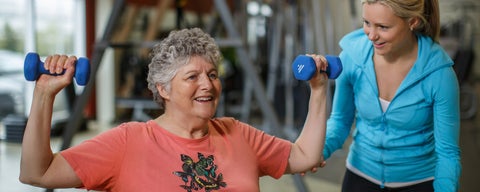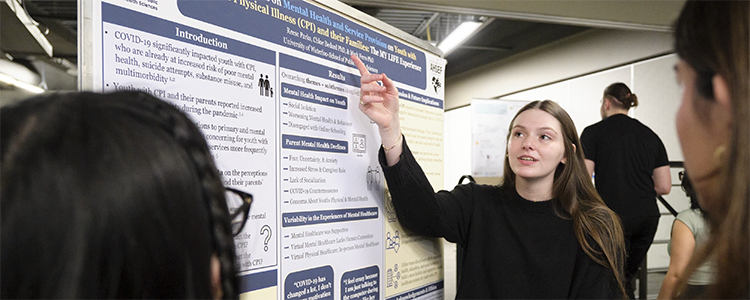Written by David, Kinesiology student
We all know Waterloo has co-op, but what about other opportunities to get real experience and build your résumé?
Whether you’re in co-op or the regular stream, there are so many ways for Kinesiology students to put what they learn to work and prepare for life after graduation.
Opportunities for Kinesiology students
While these opportunities can be pursued by students from many programs, the ones below tie directly into the Kinesiology curriculum and related careers. Let’s explore a few.
- Student trainer with Waterloo Warriors
- Centre for Community, Clinical and Applied Research Excellence (CCCARE)
- School of Anatomy
- Campus Response Team
- Research groups and laboratories

1. Student trainer for Waterloo Warriors varsity athletics
Student trainers work under the supervision of the Warriors’ athletic therapy team and gain hands-on experience supporting varsity athletes throughout their season. Student trainers provide first aid, taping, sideline injury assessments, and other essential support for athletes.
Related Kinesiology courses:
- KIN 140L: Sports Injury Management Laboratory (highly recommended for trainers)
- KIN 400: Athletic Injury Practicum
Being a student trainer is excellent career preparation for aspiring:
- physiotherapists,
- chiropractors, and
- athletic therapists.
I’ve gained a lot of skills in working as a team, taping, and assessing musculoskeletal injuries in a practical sense outside of the classroom.

2. Centre for Community, Clinical and Applied Research Excellence (CCCARE)
Getting involved with CCCARE is an amazing opportunity to gain valuable experience and give back to members of the greater Kitchener-Waterloo community without even having to leave campus.
Led by a multidisciplinary team of Waterloo researchers, certified exercise specialists, clinical experts, and students, CCCARE runs exercise programs and research with clinical populations, such as those living with or recovering from cancer, mild cognitive impairment or dementia, and those who have had a stroke. Related Kinesiology courses:
- KIN 204: Movement Assessment and Exercise Prescription
- KIN 390: Clinical Field Placement
- KIN 414: Clinical Exercise Physiology
Getting involved in CCCARE offers great experience for those interested in becoming a
- certified personal trainer,
- clinical exercise physiologist, and
- healthcare professional or professional who works with clinical populations.
Here's what Kevin, a fourth-year Kinesiology student, enjoyed about his experience with CCCARE.
3. School of Anatomy lab
Every Kinesiology student takes KIN 100L: Regional Human Anatomy Lab in the winter of first year. Once you’ve taken this course, you can sign up to volunteer with the School of Anatomy to continue building your knowledge, experience, and skills. Here are some additional opportunities in anatomy.
- In the volunteer pro-section training program, you can assist with the dissection of human cadavers used for teaching in the lab.
- Outreach volunteers help deliver educational opportunities in the anatomy lab for healthcare professionals and high school students.
- Volunteer teaching assistants help facilitate labs and guide students as they learn anatomy.

These volunteer experiences help reinforce your learning and tie into upper-year anatomy courses including:
- KIN 301: Human Anatomy of the Central Nervous System
- KIN 305: Human Anatomy of the Thorax, Abdomen, and Trunk
Volunteering in the Anatomy Lab can be a great way to gain experience if you are thinking of entering the medical field, teaching, or research.
This experience has definitely helped me with career planning. I want to pursue anatomy past my undergraduate degree, and I don’t think I would have known that prior to having this volunteer opportunity.
3. Campus Response Team (CRT)
CRT is a student-run team that is hired for on-campus events and operates as a first response to any injury or medical emergency (while Emergency Medical Services travels to the scene). CRT is a great way to develop and put your first aid skills into practice and gain more advanced first aid training.
Waterloo’s Kinesiology curriculum focuses on the mechanisms and treatment of injuries and illness and the overall functioning and systems within the human body. So, there are a lot of courses that relate to CRT and first response. Two examples include:
Volunteering for CRT offers great experience for those thinking about a career in:
- medicine/Emergency medicine,
- paramedicine,
- first response, and
- healthcare.
Here's what Samantha, a second-year Kinesiology student, has learned through this experience.
4. Research
Research is a big part of what happens at universities. Kinesiology at Waterloo is a hub for research that’s focused on preventing injury and illness and promoting health. Kinesiology professors work in the areas of biomechanics, neuroscience, and physiology and nutrition.
In addition to volunteering or finding a paid role in a research lab, there are specific Kinesiology courses students can take that have research experiences built right in.
- In KIN 391: Research Apprenticeship, you’ll work with a professor to support their research and become familiar with how research is done. For example, you may be asked to conduct an exercise protocol and ensure the safety of the research participant while taking needed measurements.
- KIN 431: Research Proposal & KIN 432: Research Project give you the skills you need to properly design, conduct, and carry out your own research project.

Doing research as an undergrad is a great way to see if it’s something you enjoy and might want to pursue further. Career wise, these opportunities are great preparation for graduate studies, professional school, or a career in
- clinical research,
- biotechnology, and
- product design and development.
These are just a few of the many ways you can take what you’ve learned in class and apply it to the outside world – before you even graduate! Getting hands-on experience is a great way to reinforce your learning and build your résumé. These opportunities can also help you determine what you like and what you don’t like, which is key in discovering your career path after graduation.
Related articles

Co-op or regular in the Faculty of Health? Take our quiz!
Co-op or regular? Whatever you choose, get career-ready skills and experience.

How to become a recreation therapist
If you’re interested in a health care or human service profession — and you’d like to improve the functioning and quality of life for others through recreation, leisure, and play — recreation therapy could be for you.

Health care jobs in demand for the future
If you care about health and helping others, there’s a place for you in health care — and as our population ages, a wide range of health care jobs will be in high demand for the future.

